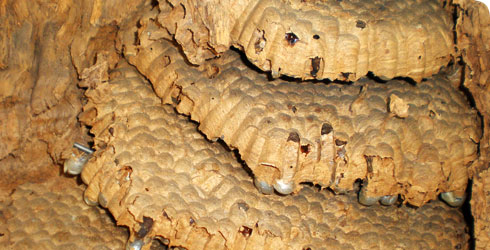Biology
The hornet, like all other Vespinae - except for some social parasite, 'cuckoo' species - is eusocial. This means they live in colonies and most progeny are sterile females called workers.
The nest is constructed in a cavity that might be in:
- a dead tree
- a hole in the ground
- thatch
- an old bee hive
Initially, a small nest is constructed by the queen.
The young are fed mainly on insects whilst the adults subsist mainly on nectar, sap and other sugary secretions.
Once the workers start to emerge as adults, they expand the nest.
The nest is constructed of papery material derived from rotten wood, which the hornets chew and apply as paste.
Inside the nest are cells in which the larvae are individually reared.
The nest is protected by an envelope. The outer surface is striped cream, brown, yellow and white and has characteristic 'bubbles' or 'blisters', which probably help regulate the temperature of the nest.
Late in summer, males and queens are produced. Mated queens are the only individuals that over-winter, usually in soil or in cavities. They found new colonies in the spring. The old nest is not re-used.
Workers can be conspicuous as they hunt in woodland but are rarely aggressive or sting when unprovoked.
They often fly on warm nights, are attracted to lights and may enter houses.
For this reason, hornets can be a hazard when light trapping for moths! The sting is painful and can throb for several hours.
Hornets can be a nuisance around bee hives as they prey on honey bees near the entrance.
Reproduction
All Hymenoptera have a peculiar sex-determination mechanism, whereby fertilised (diploid) eggs become females but unfertilised (haploid) eggs become males.
Thus, females have the usual 2 sets of chromosomes but males have only 1 set.
This system of sex determination can produce wasp sisters that are more closely related to their siblings than to their own offspring. The system may have played a role in the evolution of eusociality, where workers do not raise their own young.
